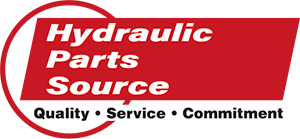Corrosion is high on the list of causes rendering a hydraulic system useless.
Corrosion is the chemical reaction between a metal and a chemical, typically an acid. Rust is the chemical union of ferrous metals (iron and steel) with oxygen, usually caused by water. Rust wears away metal surfaces and creates internal and external hydraulic system leaks.
Below, we explore common causes of corrosion. Proper maintenance, such as the tips discussed at the end of this article, helps prevent rust and system leaks.
3 Common Causes of Hydraulic System Corrosion
Hydraulic system corrosion and the rust it causes can create damaging leaks, which are often costly and time-consuming to repair. Here are 3 common causes of systemic corrosion:
Cause #1: Seal Failures
Seals are the hydraulic component that prevents foreign particles from entering the system. Damaged seals, those not properly aligned, or worn, allow contaminants to enter the system. If contaminants contain water or particles, they trigger chemical reactions that cause corrosion and wear down metal parts, resulting in leaks.
Cause #2: Poor Fluid and Material Selection
Corrosion results when the fluid and component materials are not compatible. Fluid such as acids, crude oils, ammonia and others will exhibit sometimes-damaging physical and chemical properties. If you have selected a non-compatible fluid and material, you risk corrosive reactions in your system.
Water also supports biological or microbial growth, especially when systems stand idle for long periods. The resulting biomass tends to be corrosive, slimy, and has an unpleasant odor.
Another contaminant is the byproducts of incompatible oils. Mixing synthetic hydraulic oils with mineral-based oils may form foam or sludge, for example. Oil incompatibility can break down and eliminate the chemical additives that prevent corrosion. An incompatible detergent can destroy antifoam agents and permit the oil to retain excess air. This is a problem as air-laden oil degrades pump efficiency and increases oxidation, which can chemically alter the fluid.
Cause #3: Heavy Load or Long Duration Operation
A heavy load in the hydraulic system and continuous operation for long periods can overheat a system. In such an environment, the fluid temperature will automatically rise and affect fluid properties. Heat allows the fluid to absorb more water, accelerates oxidation, and increases chemical reaction times. This can cause corrosion.
6 Corrosion Prevention Tips
Preventing corrosion is necessary for improving the lifespan of your hydraulic system and protecting it from leaks. Follow the tips below to eliminate or reduce corrosion concerns.
Tip #1: Select and maintain the Right Fluid
Select the hydraulic fluid that suits the system material and application. Using the correct fluid will reduce chemical attacks. Maintaining the fluid is vital to controlling corrosion. Eliminating water in the oil will reduce the ability of the fluid to react with the metal components of the system. Avoid fluid oxidation because this will allow acids to build up and break down the rust and corrosion inhibitor additives in the fluid.
Tip #2: Replace worn/defective Seals
Provide a proper seal for every component and ensure tight connections to eliminate contaminants such as water, air and dirt.
Tip #3: Inspect Regularly
Inspect the system at regular intervals and carry out basic maintenance tasks. Take fluid samples and have them tested for water and overall fluid condition. This is the foundation of a good contamination control program.
Tip #4: Use Oil Additives
Use anti-wear hydraulic oil additives that will protect the system from wear and corrosion.
Tip #5: Install an Oil Cooler
Install a suitable oil cooler to reduce the temperature of the system and help maintain desired fluid properties. Replacing worn components that can cause a decrease in power efficiency help reduce the amount of energy lost in the form of heat in the hydraulic system.
Tip #6: Install a Filter
Install a proper breather filter on the reservoir to prevent the foreign particles from entering the reservoir. Replacing the filter in necessary conditions is also important. Breather filters equipped with some type of water vapor removal device such as a desiccant or coalescing material will reduce the amount of water formation inside the reservoir where it can contaminate the fluid.
Conclusion
Corrosion can create serious and expensive damage to a hydraulic system. Proper set-up and maintenance can go a long way toward keeping a hydraulic system running corrosion free over time.

